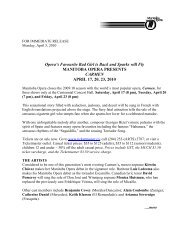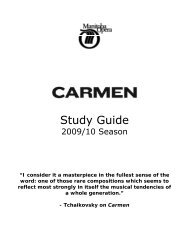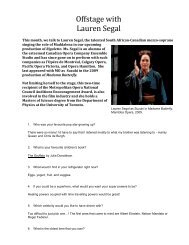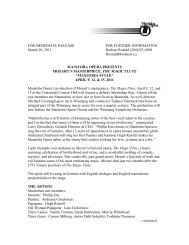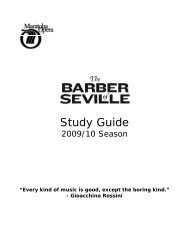La Traviata Study Guide - Manitoba Opera
La Traviata Study Guide - Manitoba Opera
La Traviata Study Guide - Manitoba Opera
You also want an ePaper? Increase the reach of your titles
YUMPU automatically turns print PDFs into web optimized ePapers that Google loves.
From 1872 to 1883, Verdi temporarily ‘retired’ from opera writing. He continued to compose<br />
music, including the Manzoni Requiem, considered his most important non-operatic work. Much<br />
of this time period, however, was devoted to his farm. Then, in 1884, he began work on his<br />
second-last opera, Otello. It premiered in 1887 to great anticipation and then to great acclaim. At<br />
age 80, Verdi wrote one last opera, Falstaff, based on another Shakespearian play.<br />
Verdi died in January, 1901. Italy mourned his death, closing schools and holding a special<br />
session of the Senate where eulogies were read. Thousands jammed the streets to see his funeral<br />
procession.<br />
Verdi, Politics, and <strong>La</strong> <strong>Traviata</strong><br />
Verdi did a brief stint as a politician, serving in 1863 as (elected) deputy to the newly formed<br />
Italian Parliament. Although he was a passionate Italian patriot, Verdi hated politics and did not<br />
remain long in the parliament. He was made a lifetime senator by King Victor Emmanuel in<br />
1874, but Verdi only showed up once and that was to take his oath.<br />
Verdi was a great disciple of the Italian patriotic movement known as the Italian Risorgimento<br />
(ca 1750 – 1879). It strove for Italian unification and a new social order. As a believer in the<br />
movement, Verdi wanted the staging, sets and costumes for his opera <strong>La</strong> <strong>Traviata</strong> to be ‘modern’<br />
in keeping with the contemporary issues of his times. He saw his artistic role as an opportunity to<br />
shape the Risorgimento and to help unite Italy, with a common language and no internal<br />
boundaries. Verdi was a diplomat who sought to contribute to the Risorgimento through peaceful<br />
means.”<br />
Censors and <strong>La</strong> <strong>Traviata</strong><br />
Contemporary morals affected how Verdi could tell the story based on Dumas’s novel and play.<br />
Fortunately, the story was well known at the time and Verdi was able to leave out story parts that<br />
would offend the censors. The audience could fill in the gaps. Venice, where the opera was first<br />
performed in 1853, was one of the few cities where <strong>La</strong> <strong>Traviata</strong> could be produced without<br />
extensive changes. The original title, Amore e morte, however, had to be changed and the time<br />
set back to about 1700. Verdi strongly objected, but the censors did not want the ‘lascivious’<br />
goings-on in the story to be seen as a reflection of ‘modern’ life.<br />
Censors continued to influence the artistic freedom of the composer and librettist. When <strong>La</strong><br />
<strong>Traviata</strong> finally played in Naples, Violetta and Alfredo could not be portrayed as living together<br />
in Act II. Instead, she was shown as a recluse whom Alfredo had come to visit. Germot<br />
considered her unworthy for her son, not because she was a courtesan but because she was of<br />
low birth. In Rome, Alfredo was already engaged. When he returned in the last act, he was a<br />
widower.<br />
Et Cetera, Et Cetera, Et Cetera<br />
A biographer of Giuseppe Verdi’s, Carlo Gatti, kept a prized copy of the original <strong>La</strong> <strong>Traviata</strong><br />
manuscript. It amused him no end to note that, in the first draft of Violetta’s “Sempre libera,”<br />
Verdi had simply written alle fine et cetera after the first few bars.<br />
“One of the greatest melodies every composed,” Gatti said, “and Verdi just writes ‘to the end, et<br />
cetera,’ as though everyone knew it already. Et cetera for whom, I ask you? Not for anyone<br />
except a genius like Verdi. Fortunately, in a later draft, he took time to write out the whole<br />
melody.”<br />
9



